- Home
- Jonathan Stroud
The Leap
The Leap Read online
Contents
Cover
About the Book
Title Page
Dedication
Chapter One
Chapter Two
Chapter Three
Chapter Four
Chapter Five
Chapter Six
Chapter Seven
Chapter Eight
Chapter Nine
Chapter Ten
Chapter Eleven
Chapter Twelve
Chapter Thirteen
Chapter Fourteen
Chapter Fifteen
Chapter Sixteen
Chapter Seventeen
Chapter Eighteen
Chapter Nineteen
Chapter Twenty
Chapter Twenty One
Chapter Twenty Two
Chapter Twenty Three
Chapter Twenty Four
Chapter Twenty Five
Chapter Twenty Six
Chapter Twenty Seven
Chapter Twenty Eight
Chapter Twenty Nine
Chapter Thirty
Chapter Thirty One
Chapter Thirty Two
About the Author
Also by Jonathan Stroud
Copyright
About the Book
I lie awake, thinking of Max and what has become of him.
No one believes Charlie when she tells them what happened to Max at the Mill Pool. The doctors and her mother think she is in shock; even her sympathetic brother James cannot begin to understand.
So as she recovers in the hospital bed, Charlie vows to hunt for Max alone. She knows that Max is out there somewhere. And to catch up with him, she’ll follow his trail wherever it goes – even beyond the limits of this world. And she’ll never give up, no matter what the cost.
For Charlie knows that the unbelievable is true.
For Nana
and to the memory
of K.A. Stroud
ONE
IN THE GREEN water, among the rushing bubbles, he is looking at me still. His face shows white against the moss and the weed fronds.
As I watch, he mouths my name through the soundless water. An explosion of bubbles erupts from his lips. They race forward and cling to my eyes and face and for a moment I am blind. Then they boil upwards towards the daylight and I can see again. And I just have time to catch his eyes once more, as they turn away from me into the dark, and his face is swallowed by the greenness all round.
He is gone. I open my eyes. The ward is dark, and someone is crying. I know him without turning: it is the boy in the end bed, nearest the orange night-light. Small and hollow-cheeked, with his leg in plaster, he has often cried before. Tonight he is lonely, sick and homesick, and it is many hours before his mother will visit him again. His weeping sounds thin in the shrouded ward. I wait, watching out of the corner of my eye. Soon the crisp, efficient shadow of the nurse appears beside his bed. The outline of her hand reaches down and touches his hidden face. A murmured question comes, soft and comforting, then the small sounds of his gulped replies. He sinks down into the high pillows. She straightens and melts away. I lie back and close my eyes.
Max does not come again. Try as I might, I see nothing – instead I become aware of the starched restriction of the bed clothes, pressing close against my body. My arms are pinioned by my sides and only my head, in its deep halo of pillows, is free to turn. I have been tucked in well. To secure me any tighter, they would have had to use a straitjacket.
My legs fidget under the taut clean sheets. It is my sixth night here, and tomorrow, perhaps, they’ll let me home. Even if they do, I’ll have to see a doctor every week – and not a lung doctor either. My chest did give me trouble, but it’s been fine for days now and still they’ve kept me in, using it as a pretext to watch me, talk with me, and prove I’m mad.
A single car is moving in the night, far below the window. Around it, the city sleeps. I lie awake, thinking of Max and what has become of him.
They are careful now never to mention his name. But he is there all right, heavy in their faces – in Mum’s and the doctors’ – and in the eyes of the nice policewoman who did her best to make me give my story up. They seem unable to invoke him, scared of what he might do. And I never help them out, not even when their meaningful pauses invite me to talk about Max again. They hold the door open, but I never walk through. I learn fast, you see. After the first time, and after Mum, I’m saying nothing. I’ve said nothing for so long now that I think they wonder if I am blanking him out. And I know that is what Mum is hoping.
Fine, let them think it. Let them leave me alone, to lie here and think of Max.
I like the darkness. It is both a veil and a screen for memories to be hung upon. To the nurse, the homesick boy, the others sleeping hammocked in the heavy black warmth of the ward, there is nothing to be seen. But for me, the room is brightly lit with images crowding down on every side. I can view them all, alone.
I rerun a scene. Max and I, on our bikes. Away from his street and down the hill road, out of town. Past the canal, the pubs, the blank fronts of the factory buildings, with Max always in front, me always behind. Under the flyover and the last estate and out into the September fields, with the sun shining and our legs going and the wind squeezing tears out of our eyes. A good run, good enough for sweat to break out on my back, and my thigh muscles to start complaining.
Through the brown fields, slower now. Max began to tire, and I made up the gap, coming alongside him. He was red in the face, grinning with concentration. We came to the little bridge over the river. There were willows by the water and an unkempt meadow that didn’t look too soft or wet. I was for trying it, since the water was deep enough for fish, but Max said no, he knew a better place. We cycled on.
Somewhere in the ward the night nurse’s buzzer goes. I hear it faintly, a muffled sound. On padded feet she comes, prowling down the corridor, looking for the flashing light. In my bay, everyone is sleeping – except for me, and I am very still. She passes and her footfalls fade. For some reason a desperate weight grips my stomach and I feel the prickle of tears coming. Stop being stupid, Charlie – think back, play the images on the night-screen. Watch and remember.
I had been to the mill before. Mum had taken me there, with James, last summer. Overgrown with weeds and thorn, the little path meandered along between two ugly electric fences. We wheeled our bikes up, breathing fast, to join the dirt road that ran over the cattle grid to the mill stream. A public right-of-way the track was, though the mill itself, behind its high wall, was private and operational, supplying some little baking firm up town.
Men’s voices sounded over the red brick wall. The mill stream disappeared into a low-slung arch in the stonework. We went round the side, past the mill to the back of the buildings and the wheel.
It was turning. We stood at a vantage point on the lip of the brick, looking down at the hellish cauldron of foam and churning milk. The wall was drenched in spray and the bricks were covered in sponge-wet moss. The wheel roared in the shades below the parapet, huge wooden cusps erupting from the stream, rising out and upwards in an endless arc, then ducking away again, leaving us deafened. The air was wet and cold and cooled us quickly after our ride. Max clambered out on to the rough stone lip above the frothing water, hanging his legs out over the edge to embrace the light white spray.
The image goes out. I realise I am staring into space like a sightless fish, and all the muscles in my neck are hurting. I wrestle myself into a new position, fighting the sheets to get on to my side. It ruins the nice matron’s tucking, but I haven’t moved properly since Visitors’ Hour when Mum and James finally left. It was James’s first time. He was sheepish about the whole thing and only caught my eye once when Mum was telling one of her non-stories
. But he was upset too. You could tell because he kissed me when he left, in an awkward sort of way. I wonder how much he’s heard, and what he thinks of me. The pillows bite into the side of my face, and my cheek feels raw and rough. I want to rub it, but I stay quite still now, looking towards the window and the night, where the wheel is turning.
Below the mill wheel was a sluice, and beyond that the stream continued along until it opened out into a shady mill pool, fringed with stone. This was where Max intended us to fish.
‘I saw some big ones here once.’ He flung his bike down at the foot of a plum tree and took his fishing rod from the pack strapped to its back. There was a ring of plum trees around the pool, each one hunched and shrivelled with age. I considered them while Max fixed the bait. The plums in the branches hanging out over the water were ripe and dark.
Max was ready. We sat down on the stone lip of the quiet pool and he made his first cast. The water was still and idle-looking, and the sun reflected lazily off the surface. It was a hot afternoon.
Thrushes sang from the trees and the sun beat down on our backs and we caught nothing. Every now and then, big fat carp with white eyes and ghostly swathes of grey on their sides rose up slowly from the murk and hovered just below our dangling bait, for all the world as if they were watching. Not once did they try to bite, but just stared dumbly, before turning away with a swift flick of the tail. Max was very bad at fishing. I said so. He threw his rod to one side and we lay back gazing at the sky.
Lying in the bed, a dull pain flashes in my calf, though the bandage is long gone and the marks are fading. The doctors say that Max must have scratched my leg and I hate them for that more than anything else. Not because they don’t believe me – they don’t believe anything I’ve told them. No, what makes me mad is that they think I kicked out for the surface while he was alive and reaching up for me. Kicked out and left him. And they don’t tell me I’m a coward to my face, but just ask me how I am, and look regretful, and refuse to mention Max by name.
And anyone could tell you he didn’t have long nails to scratch with.
He was probably biting them then, lying by the pool with the mid-afternoon sun warming his face. He hates being still, gets restless. I was dozing beside him, as the heat and the long ride began to catch up with me. But I wasn’t allowed to lie quiet for long. After a minute or so, he stirred and spoke.
‘Well, if fishing’s out, let’s swim instead.’
I raised myself sluggishly and looked at the water. ‘Don’t be stupid,’ I said. ‘It’s not that hot, and I haven’t brought my costume.’
Max laughed from below. He was lying back with his arm shielding his eyes from the sun. ‘Nor have I,’ he said. ‘I’ll dive starkers. I don’t care.’
I shrugged. ‘You may not. I need a costume.’
‘You’re just chicken. I wouldn’t look.’ Max leaned up on his elbows and surveyed the pool. I said nothing. I wasn’t going in and I didn’t think Max was either. His enthusiasm seemed to have dampened down a bit. Maybe it was the quiet stillness of the pool and maybe it wasn’t.
‘Off you go then,’ I said, helpfully. ‘I’ll guard your clothes.’
Max grunted. ‘In a bit.’ He looked around him restlessly. Something had put him out of sorts.
‘We should have brought lunch with us,’ he said. ‘There’s no shop for miles.’
I raised a lazy finger. ‘Plenty of free food around. Hop up if you’re hungry.’
The plum tree’s heavy-laden branches hung out over the mill pool, warped by years of gales. Max eyed them narrowly. A new challenge was revealed.
‘Maybe I will, if you’re chicken.’
‘Throw some down for me.’ I lay back and closed my eyes. There was a bit of scuffling and a couple of curses and when I risked a look I saw Max’s feet and bottom rapidly disappearing into the tree above.
‘Watch it, Max. You’ll be over the water.’
‘He who dares gets the plums.’
He inched out along a sturdy branch until he sat about two feet beyond the stone lip of the mill pool. There he wedged himself into position, plucked a purple-black plum from a nearby clump and shoved it whole into his mouth. In a matter of seconds he had devoured it. He spat the stone into the water where it disappeared with a dull splot. I called for my share, but I had to wait until he’d dispatched another two before he threw me one. It was very ripe and very sweet.
I sat on the ground between the tree and the edge and ate a couple more. Quite soon I lost my appetite. Whether or not it was the fruit, I had a dull ache in my stomach and could only wonder that Max kept popping plums into his mouth, undaunted by sheer quantity. The fall of plum stones continued like a light rain.
Then the rain stopped. Max must finally be stuffed. I looked up at him. He was very still on his perch, with his head tilted on one side. Surely he couldn’t have fallen asleep? No, his eyes were wide open, and so was his mouth, and he was gazing down into the water six feet or so below him. His hands were white and gripped the branch as if he feared to fall. I followed his gaze to the pool, but saw only the reflection of the sunlight which hurt my eyes.
‘What’s up, Max?’ I called out sharply; Max seldom stopped to look at anything. ‘Hey, Max, pass us another.’
There was no answer. I called again. Still he gazed down into the dreamy depths of the pool and made no move or sound. A pang of panic gripped my chest, though Max had often ignored me in the past, just as I had often ignored him.
‘Max! Say something! Snap out of it – if this is a joke, it’s not funny. You look like a fool with your mouth open like that. Get a grip.’ I didn’t know why I was so concerned, and that irritated me in itself. ‘Come on, answer me—’
I broke off. Suddenly, as if responding to a call, Max swung his legs so that they were hanging off the branch and he was sitting looking down between them. And then, with barely a pause, and with no break in his concentrated gaze, he gave a violent push forwards and toppled into space.
He fell without a sound, and the waters of the mill pool closed over him. I sprang to my feet with a cry and leaned out over the edge, scanning the surface. No bubbles rose. There was one swirl of a wave, just one, and then the surface was still again, as calm as ever.
I waited.
Time froze at the edge of the pool. I waited, waited for his head to reappear.
Here in the quiet night the boy in the end bed has woken and is crying again. This time the nurse does not hear him. He cries on, his weeping draining away into the darkness. My eyes are wide open, staring. The image on the night screen is frozen; the surface is still. Slowly, slowly, he cries himself to quietness. Silence fills the ward.
A wood pigeon called – its sleepy sound cuts me like a knife. And with that, the birdsong that had broken off at the single splash suddenly resumed. Time started up once more and I kicked off my shoes and dived into the pool.
As I hit the water, the warm sun was peeled off my back as if I had been flayed. My body stung with the cold, my ears rang with silence. All the little flitterings and soothing cries of that late summer day were left behind. I opened my eyes and saw around me a green-grey void. Behind me were the stones of the mill pool’s edge, caked in long green fronds that stroked my legs with clammy tips.
I passed them by. Around and below was an emerald green emptiness, speared here and there by weak shafts of sunlight which had broken through the surface and now faded away into the depths. The pool was very deep.
Far off, in the green reaches, I saw Max. He was swimming, but swimming down, his face turned from the hot sun. I pursued him with a knot of panic in my belly and the blood pounding in my head, but hard as I beat my legs, I could not catch him. And then I noticed other things moving in the water; pale thin women with long hair streaming like river moss, who wrapped their arms around him as he spun in the waters of the mill pool.
I swam towards them, and they turned, and Max’s face was white and his eyes were open, but I knew he couldn’t see
me any more. He smiled and the women smiled with him, and they could see me all right – they were looking at me with eyes as green as buried pebbles.
One of them kicked her legs and floated over to me, reaching out with long thin fingers and smiling. Her touch was cold, like a mountain brook in winter, and when she opened her mouth, I heard bubbling like water between deep stones. Her hair drifted languidly before my eyes, her fingers brushed my neck, and I felt a laziness grow over me, a sleepy desire to float amid the quiet things in this peaceful pool, to drift among the rocks and broken wood and lost, forgotten things and never feel the harshness of the sun again. But I had seen the eyes of my friend Max, and seen his skin, all pasty-white like feet dangled in a river through a summer’s afternoon. And suddenly I longed for the touch of wind, the endless colours of the sky and earth and for the sounds that fade in layers across the hills.
So I set about her with my fists, and tore myself from her slender arms. Her mouth opened in startled rage and the water around us turned to foam. I kicked upwards towards the dim daylight arches as her fury sent a million bubbles rushing round me.
Then a hand reached up out of the foam and grabbed my ankle. In my terror, I lashed downwards with my free foot and made sharp contact with something solid. The hand released me, but dragged its nails across my leg as it fell away.
Now the bubbles seemed to carry me upwards in a cushion of spume, and the light grew in brightness till it burst upon my head with all the heat of the late summer air. I floated in the very centre of the mill pool, with the blood throbbing in my wounded calf. The bubbles vanished and the thrushes sang in the plum trees. The afternoon was two minutes older than when my feet had left the edge, but that moment had receded in my head to distant depths and the birdsong sounded strange. I swam to the edge and hauled myself out on to the hot stone, from where I gazed stupidly at the calm waters of the mill pool, which hid my friend forever. My lungs breathed air, but cold green water filled my heart.
TWO
AFTER AN HOUR I began to expect Mum back. An hour was long enough for a visit, especially when you’ve left your son in the car without food or drink. You could probably get into trouble for that, like leaving your dog in the back seat without opening the window.

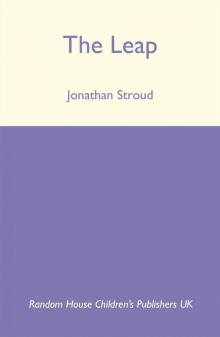 The Leap
The Leap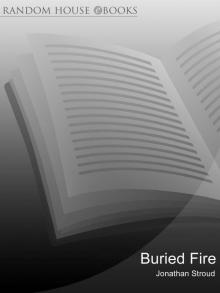 Buried Fire
Buried Fire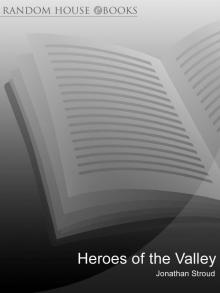 Heroes of the Valley
Heroes of the Valley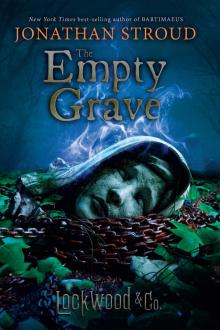 The Empty Grave
The Empty Grave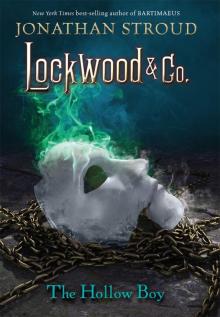 The Hollow Boy
The Hollow Boy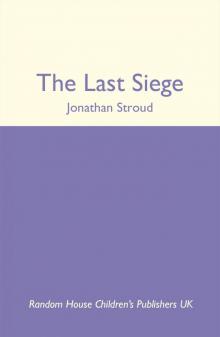 The Last Siege
The Last Siege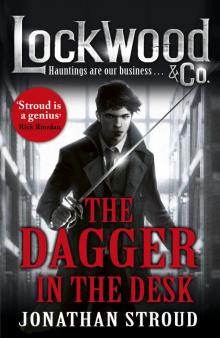 The Dagger in the Desk
The Dagger in the Desk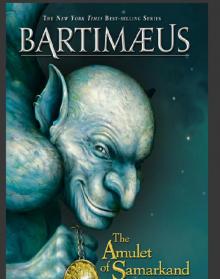 The Amulet of Samarkand
The Amulet of Samarkand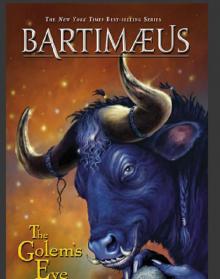 The Golem's Eye
The Golem's Eye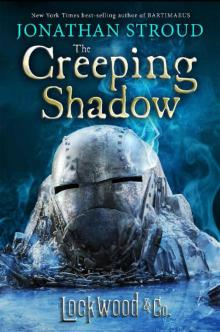 The Screaming Staircase
The Screaming Staircase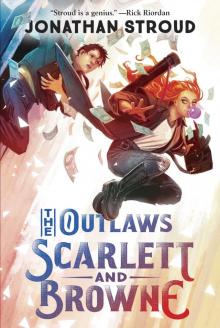 The Outlaws Scarlett and Browne
The Outlaws Scarlett and Browne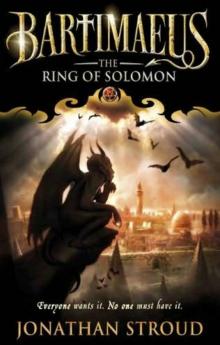 The Ring of Solomon: A Bartimaeus Novel
The Ring of Solomon: A Bartimaeus Novel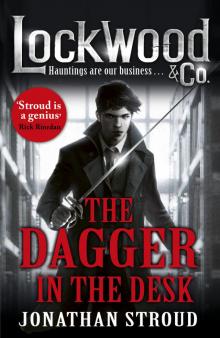 Lockwood & Co
Lockwood & Co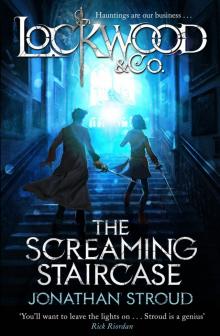 Lockwood & Co: The Screaming Staircase
Lockwood & Co: The Screaming Staircase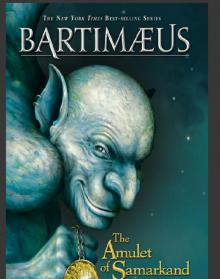 Bartimaeus: The Amulet of Samarkand
Bartimaeus: The Amulet of Samarkand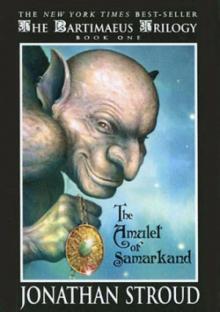 The Amulet of Samarkand tbt-1
The Amulet of Samarkand tbt-1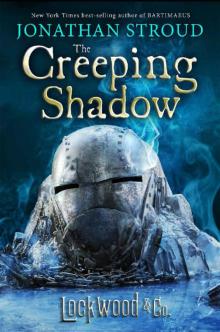 Lockwood & Co.: The Creeping Shadow
Lockwood & Co.: The Creeping Shadow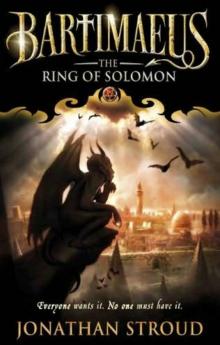 The Ring of Solomon
The Ring of Solomon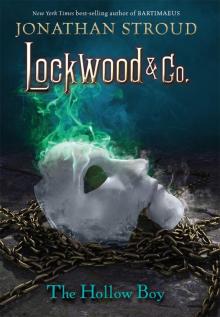 Lockwood & Co. Book Three: The Hollow Boy
Lockwood & Co. Book Three: The Hollow Boy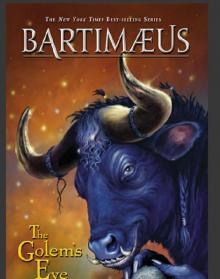 Bartimaeus: The Golem’s Eye
Bartimaeus: The Golem’s Eye